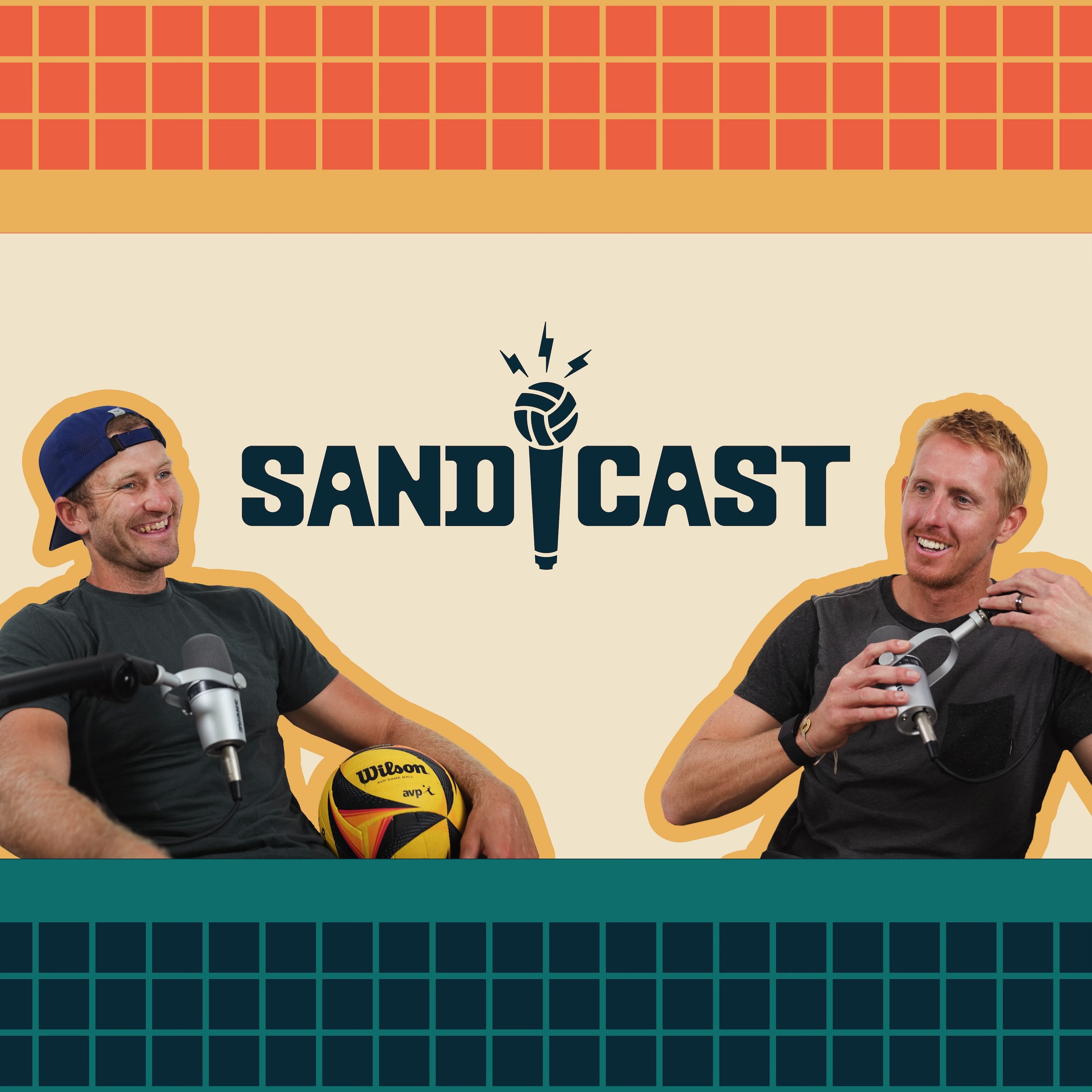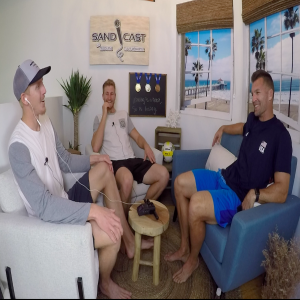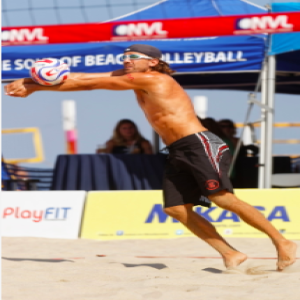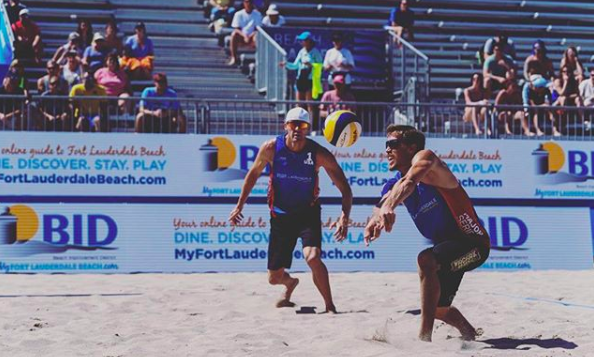

1.1M
Downloads
466
Episodes
SANDCAST is the first and leading beach volleyball podcast in the world. Hosts Tri Bourne and Travis Mewhirter take listeners into the world of the AVP, Volleyball World Beach Pro Tour and any other professional beach volleyball outlets, digging deep into the lives of the players both on and off the court as well as all of the top influencers in the game.
Episodes

Wednesday Jan 23, 2019
Rich Lambourne: The humble, self-deprecating, sarcastic gold medalist turned coach
Wednesday Jan 23, 2019
Wednesday Jan 23, 2019
The talk always turned to Taylor.
As Taylor Crabb and Jake Gibb grew and developed as a new team, climbing the world ranks, piling up wins that once could have been perceived as upsets – over 2017 World Champs Andre and Evandro, over Phil Dalhausser and Nick Lucena, over Italians and 2016 silver medalists Paolo Nicolai and Daniele Lupo – most looked to Crabb, the 26-year-old quicksilver fast defender, as the reason for that success.
It’s a justifiable stance, and not entirely wrong. But Gibb, appearing on SANDCAST: Beach Volleyball with Tri Bourne and Travis Mewhirter, while giving Crabb his due, also pointed to another source of that success: Rich Lambourne.
“We’ve got a guy with a gold medal around his neck,” he said.
Not that you’ll hear Lambourne mention that gold medal, earned as a libero on the U.S. indoor team in the 2008 Olympics. In nearly an hour on SANDCAST, it came up just once, in passing. The vast majority of his many accolades went unmentioned as well – Best Libero of the World League in 2007, NORCECA Continental Championship 2007 gold medal, being named best libero as the U.S. won their first World League title in 2008, the fact that he played in every set of the Beijing Olympics in which the Americans won gold.
No, that just wouldn’t be Lambourne, a paragon of humility, self-deprecation and sarcasm. A struggle of many players-turned-coaches is turning off the player inside them, one that Brazilian Jose Loiola admitted he struggled with. Lambourne laughed. He had no such struggle.
“What’s been interesting to me, it’s been a huge and ongoing learning process for me because I don’t have personal, professional frame of reference to the game,” Lambourne said. “Jose has 20 years of repetitions and tournaments that he went through in this particular discipline of the sport, and I don’t. I have, I think, some technical expertise that has some high degree of transfer that I can bring, but the rest of it – strategy, how can we accomplish getting that team out of system, or how can we accomplish putting them in positions we want them to be in that are advantageous for us, it’s vastly different outside than it is inside. So all that stuff is stuff I had to learn, stuff that I’m still learning, that’s still evolving.
“So that’s been the challenging, and what’s been fun.”
They’ve created a collaborative dynamic, Lambourne, Gibb and Crabb, begat from three vastly different perspectives on the game. Lambourne is the indoor specialist with a sharp mind for the game. Gibb is one of the all-time greats, a three-time Olympian with a likelihood of making that four. Crabb has set himself firmly in the conversation as one of the best defenders in the world.
“I try to bring what I have to them, and they try and fill in the gaps with, in Jake’s case, 20 years of experience at the highest level,” Lambourne said. “And in Taylor’s relatively short career, how much amazing stuff has he done? So I’m never going ‘Uh, no, let’s do this.’ I’m saying ‘Here’s what I think, here’s what you think, so let’s decide so we’re all on the same page.’”
That same page, at the moment, has put Crabb and Gibb as arguably the best team in the United States. It's put them on track for Lambourne to appear in his third Olympics, Gibb his fourth, Crabb his third. Just don't expect Lambourne to take much, if any, credit.
"No, I take full credit for Taylor's success," Lambourne said, laughing.
So there it is, the only type of credit Lambourne will take: the sarcastic type, full of self-deprecation, and nothing about the gold medal hanging from his neck.

Wednesday Dec 26, 2018
Jon Mesko: Thinking deeper and celebrating Festivus
Wednesday Dec 26, 2018
Wednesday Dec 26, 2018
Jon Mesko sincerely hopes you had a merry Christmas. He really does. He’s no Scrooge or Grinch. But there’s another holiday he loves, a “Festivus for the rest of us!”
Those not indoctrinated with the classic Seinfeld episode, allow Frank Castanza, father of George Castanza, explain.
“At the Festivus dinner, you gather your family around, and tell them all the ways they have disappointed you.”
“Is there a tree?”
“No, but there’s a pole. No decorations. I find tinsel distracting.”
“Festivus is back!” Frank declares in the episode that aired on Dec. 18, 1997. He couldn’t have possibly realized that, indeed, 21 years later, it would be back, at Mesko’s new – and popular amongst the beach volleyball crowd – restaurant, Serve on Second.
But does Mesko have any grievances to air? Any long held grudges with the beach volleyball community?
“I’m here to air the grievances for Festivus,” he said, grinning, on SANDCAST: Beach Volleyball with Tri Bourne and Travis Mewhirter. “I got a lot of problems with you people and now you’re going to hear about it.”
He said this with a smile, one that suggests he was half-joking, half-serious. If you’ve messed with his nets, or his courts, or his cables, well, you might be getting a grievance from Mesko, who is so particular about the heights of his nets – formerly located on eighth street in Hermosa, now on 35th – that, prior to this year’s Manhattan Beach Open, he went out on center court, measured it, and – aha! He knew it! – the net was an inch low.
“The AVP has historically put it an inch and a half low, and the FIVB has put it an inch to an inch and a half high,” he said. “So what I decided was, ‘I’m going to walk out to the Manhattan Open final, right before Nick and Phil played Jake and Taylor,’ and it was one inch low, and that’s what the AVP sets it at, and that’s fine, so that’s what I set my net at now. I want to play what AVP, domestic tournaments are playing at.”
It is, among other enviable traits, this borderline OCD attention to detail that has allowed Mesko to be so successful in so many endeavors, and in risky fields – beach volleyball, the restaurant business – too.
“I enjoy just kind of making things a little bit better and improving things,” he said. “When I arrived at eighth street, it was pretty much just Rosie’s Raiders, hanging out and drinking, and I put out a new net and cables, putting down lines, and people just strted showing up to play. It culminated one day in 2012 with Brink and Reckermann and Jake and Rosie and the Russians and New Zealand and China and it was everybody. I just stood back and looked at it and thought it was pretty fun to watch. People just hung out after practice on my porch.”
Ah, yes, Mesko’s porch. If you’re in beach volleyball, you have likely hopped the Strand wall in Hermosa Beach and hung out on Mesko’s porch, either talking volley, losing money in backgammon, betting on something or other, perhaps measuring your height on the once-famed wall, which has since been torn down with his old place on eighth. The wall grew so famous, in fact, it had its own spread in DiG Magazine.
“The most amusing part for me was watching people tell Adam [Roberts] what they thought their height was and then seeing their real height,” he said. “Almost everybody was about an inch high except for Phil [Dalhausser], who said ‘I’m 6-9’ and, yeah, he was 6-9.”
The wall. The backgammon. The porch. The set up. The constant, top-tier talent, both international and domestic, practicing on his courts. Not bad for a guy from Michigan who hadn’t played much beach volleyball prior to moving to California in 2002 and qualifying, for the first time, in 2006, seeded Q60 with Billy Allen.
Since, he has played in more than 100 domestic tournaments, won the NVL Soul Award, enjoyed some NORCECA – don’t ask him about the net height in NORCECAs – success and built not one but two unofficial training centers, where players gravitate towards his courts like moths to a flame.
“I’ve always been kind of a bigger picture, swing for the fences, shoot for the stars kind of guy, so I really try to ask the right questions,” Mesko said. “If you really want to play high level volleyball, you’re going to end up in the South Bay or Rio or Southeast Florida. That’s where you’re going to end up.
“So at that time, 15 years ago, I was interested in girls and bikinis and playing really good volleyball and everything in between. That was Hermosa Beach. And I started looking around and thought it would be really cool to live on the Strand, so I started asking questions, ‘Well, what does it take?’ And a guy said ‘It’s going to cost $5 million dollars, minimum’ and I used that as a bar, ‘What would it take for me to make that much money?’ And I used that algorithm to maybe get there. I suppose we’re there now.”

Wednesday Jun 06, 2018
Taylor Crabb just keeps playing -- and just keeps winning
Wednesday Jun 06, 2018
Wednesday Jun 06, 2018
There stood Taylor Crabb, arms raised, trophy in hand, smiling for cameras. A familiar pose that’s becoming quite regular for Crabb. It doesn’t matter if he’s on the left side or the right, with Jake Gibb or Tim Bomgren or Chase Budinger – Crabb can and will win with whomever he’s sharing the court, wherever the court may be.
Outrigger Canoe Club? He can win there, as he did on myriad occasions, with myriad partners, as a youth.
New York City? Yeah, he can win there too, alongside Gibb. It’s the site of his first AVP victory, and could very well be the site of his third by the end of this weekend.
Austin? He can push it to the finals there as well. Despite Gibb being injured. Despite only one day of practice with Tim Bomgren. Despite Bomgren playing on a sprained ankle that by the following Monday morning it would resemble a purple and blue softball more than it did an ankle.
Laguna Beach? In a tournament he never intended on playing? With a partner, Budinger, he’d never played with? Not even a practice? On a side he hadn’t played in more than a year?
He’ll take that $4,000 winner’s check, thank you very much.
This is what Crabb does. Not necessarily the winning, though he does that plenty.
He just plays.
He plays everything. Always has. Likely always will. Nothing at the moment seems to indicate otherwise, anyway.
“I’m pretty good at listening to my body,” he said, before admitting that “I do have injuries, but I do try to stay on top of them, one being my shoulder. A lot of rehab for my shoulder. Just keeping it strong helps a ton.
“Honestly, I’m sure you know, this is only my third year on the beach so far. Your first three years coming from indoor – the sand felt so good. Your body is way better. Right now, that’s where I am: 26, off the hard court, feeling good, diving around in the sand, nothing is going to hurt me.”
He’s feeling so good, in fact, that his coaches – Rich Lambourne and Tyler Hildebrand – have to order him not to practice. And even then, he still hops in for a drill or two, because there’s a new defensive position to learn, more reps to get, more playing to do.
He’s done this his whole life.
Doesn’t matter if it’s an impromptu dunk contest on the outdoor hoops across the street as a kid. Or basketball. Or soccer. Or living room volleyball. Or local tournaments that he’d win as a teen, “and I think everybody hated us,” he said, laughing. “All these 14, 15, 16-year-old kids winning all the tournaments.”
But when you look at those kids now, it’s easy to understand why most victories went their way.
There’s Trevor Crabb, winner of two FIVBs this year, and Tri Bourne, once ranked No. 2 in the world in 2016. There’s Spencer McLaughlin and Brad Lawson, two of the top-rated recruits from their respective high school classes. There is the Beard Brothers before they became the Beard Brothers. There is Micah Christensen, who is arguably the best setter in the world, and the Shoji brothers, Erik and Kawika, Olympians both.
And Taylor. Once the runt of the litter, so small that his aunt called him “Bug,” Taylor has since established himself as perhaps the best of the bunch, discussed among the top beach defenders in the country despite only being in his third year playing beach volleyball professionally. He whiffed in New Orleans of 2015, qualified for the next two – and then took a third in Manhattan Beach with Trevor.
Since then? He’s been in six finals and another six semifinals, with wins in New York and Hermosa Beach.
“I have goals in life,” he said. “And not one of those goal is to be better than someone. The short-term goal is to defend my title in New York. That’s No. 1 right now.”